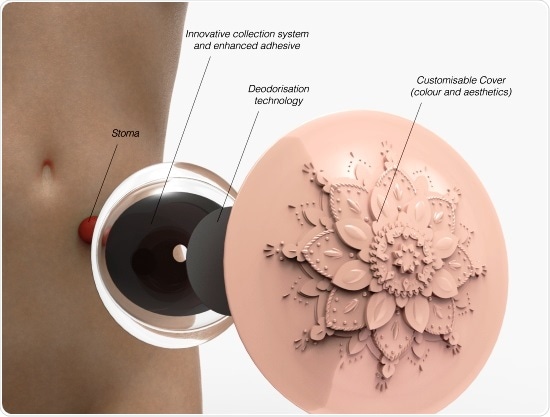Jan 10 2019
Stephanie Monty, an entrepreneur from the University of Birmingham’s BizzInn business incubator, has been awarded £310k by Innovate UK, the UK’s innovation agency. Inspired by seeing close family members suffering from the devastating effects of Crohn’s Disease, she set up her company, Ostique, to develop a new range of stylish stoma products that are beautiful as well as functional.

Ostique Mandala
Every morning 200,000 people in the UK alone face a new day with a hole in their abdomen, a stoma, which diverts bowel waste. A stoma is often necessary as a result of cancer or bowel disease. Unable to use the toilet “normally” patients must wear a “stuck-on” fabric ostomy bag over the opening to collect their waste.
Living with a stoma can be completely debilitating. The physical changes post-surgery are compounded by the limitations of currently available appliances including the bag leaking, poor deodorization and skin irritation. This impacts on patient’s physical and mental wellbeing, making daily activities such as work, socializing and intimacy, challenges fraught with anxiety. Up to a quarter of ostomates endure social isolation, anxiety, depression, even suicidal inclinations.
Stephanie’s company Ostique has developed a new range of ostomy products inspired by body art, tattoos and lingerie. Designed to give people with a stoma ‘freedom from the traditional ostomy bag’ which can be uncomfortable and stigmatizing. Ostique’s designs can be worn while swimming, on the beach, in the gym, or during intimate occasions; times when exposing a typical ostomy bag would cause embarrassment.
More akin to fashion items than medical appliances, the Ostique range will include embossed stoma covers that can be color-matched to the user’s skin and a disposable waste-collection insert. Ostique’s patented designs use innovative adhesives to reduce skin inflammation.
Stephanie set up Ostique in 2017.
During her research, she interviewed over 200 patients and found that for many, wearing an ostomy bag, rather than the stoma itself caused the greatest distress. She believes passionately that good medical design should encompass the patient’s physical and psychological needs, and set about designing products that would do just that.
Stephanie commented:
The ostomy bag is a necessity, but it is also a constant reminder of disability. The depression, social anxiety and isolation experienced by many ostomates is very real: some people are afraid to leave the house, and going swimming or baring all on the beach is something that most could not dream of doing.”
Whilst at the BizzInn, she was introduced to the ERDF-funded Medical Devices Testing and Evaluation Centre (MD-TEC), and the NIHR Trauma Management MIC, both located at University Hospitals Birmingham NHS Foundation Trust, which are providing support for the testing and commercialization of the product. Cambridge Design Partnership will work with Stephanie to create detailed design specifications, trial the product and bring it to manufacture.
The charity Bowel & Cancer Research is leading on all aspects of patient involvement, including testing the prototypes with volunteers before they go into production.
The Innovate UK funding has provided a significant boost to Ostique, which aims to launch its first products in 2022. The company is now looking for match-funding.